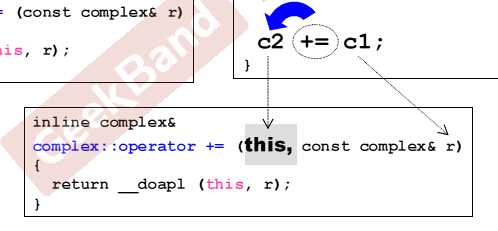标签:注意 相同 编译 分析 技术 基本类型 封装 位置 接受
class complex{
public:
complex (double r = 0, double i = 0):re(r), im(i){} //inline
complex& operator += {const complex&};
double real() const{return re;} //inline
double imag() const{return im;} //inline
private:
double re,im;
friend complex& _doap1 (complex*, const complex);
};
inline double imag(const complex& x){ //inline
return x.imag();
}
3.访问级别
private: 数据部分,封装,不被外界(class外)访问。
public: 可以被外界访问(class外)的。
定义时不一定集中在两段,可以根据实际情况交替使用两个关键字。
4 构造函数(ctor)
创建对象是调用构造函数,函数名与类名相同,无返回值类型。
下述三种创建对象方式均调用构造函数
class complex{
public:
complex (double r = 0, double i = 0):re(r), im(i) {} //可以带参数,参数可以有默认值,即未指明时使用默认值
//初始化列表 : re(r),im(i) 能使用初始化列表时尽量使用
complex& operator += {const complex&};
double real() const{return re;}
double imag() const{return im;}
private:
double re,im;
friend complex& _doap1 (complex*, const complex);
};
{
complex c1(2,1); //三种方式均调用构造函数
complex c2;
complex *p = new complex(4);
...
}
4.2 构造函数在private 区域
不能被外界调动,例如在单例模式中使用
class A{
public:
static A& getInstance(); //静态类型变量
setup(){}
private:
A(); //构造函数在private区域
A(const A& ths);
...
};
A& A::getInstance(){
static A a;
return a;
}
A::getInstance().setup(); //使用时利用类的getInstace()函数
5 重载(overloading)
同名函数可以存在,判断是否可以重载即判定编译器是否能区分两种函数使用。
double real() const {return re;}
void real(double r) {re = r;} //正确重载
complex(double r= 0, double i = 0): re(r),im(i) {};
complex() : re(r), im(i){}; // 错误,编译器无法判断, 如: complex c1; 不知道调用哪个。
6 const member functions
注意const functions中 const 的位置: 函数名之后,函数体之前
double real() const{return re;}
double imag() const{return im;}
//不改变数据内容,则一定要加const,否则可能引起错误,如:
//外界调用该函数时 使用:const complex c1(1,2);
//声明常对象,常对象不可调用非常成员函数,出现错误
7 pass by value or pass by reference (to const)
传值会造成开销较大(基本类型可以传值),能传引用时尽量传递引用(开销仅4bytes)。
如果不想给予对方修改权限,则使用const关键字 如 const complex& 为常见形式。
class complex{
public:
complex (double r = 0, double i = 0):re(r), im(i){} //pass by value
complex& operator += {const complex&}; //pass by reference
double real() const{return re;}
double imag() const{return im;}
private:
double re,im;
friend complex& _doap1 (complex*, const complex&); //pass by reference
};
8 return by value or return by reference
尽量传递引用,不可以情况参考后 8.1 和临时变量章节
complex& operator += {const complex&};
friend complex& __doapl (complex*, const complex&);
8.1 什么时候可以return by reference
函数运算返回结果
1)必须在函数内新创建对象,不能返回reference,因为函数结束时,对象消亡,引用指向的本体已经不在。
2)当返回结果是已经存在的对象,可以返回引用,常见情况this指针
inline complex&
__doapl(complex* ths, const complex& r)
{
ths->re += r.re;
ths->im += r.im;
return *ths;
}
inline complex&
complex::operator += (const complex& r)
{
return __doapl (this, r);
}
8.2 pass/ return by reference 语法分析
传递者无需知道接收端以何种形式进行接收;
如下例,返回传递仅需传递原值,接收者自己决定接收引用或接受值(调用拷贝构造)。
inline complex&
__doapl(complex* ths, const complex& r)
{
ths->re += r.re;
ths->im += r.im;
return *ths;
}
9. 友元(friend)
friend complex& __doapl (complex*, const complex&);
inline complex&
_doap1 (complex* ths, const complex& r){
ths->re += r.re; //自由取得friend的private变量,但破坏封装
ths->im +=r.im;
return *ths;
}
9.1 相同类(class)的各个对象(objects)之间互为友元
class complex{
public:
complex (double r = 0, double i = 0):re(r),im(i){
}
int func(const complex& param){
return param.re + param.im;
} //直接拿param私有变量,可以用相同类的各个对象之间互为友元解释
private:
double re, im;
};
10. 运算符重载1 ,成员函数(operator overloading)
二元操作符被编译器看待的形式:(注意是看待形式,this存在可以使用,但参数列表中this不可写出)this指向调用者

实际代码如下:
inline complex&
__doapl(complex* ths, const complex& r)
{
ths->re += r.re;
ths->im += r.im;
return *ths;
}
inline complex&
complex::operator += (const complex& r) //operator += 在程序员使用时可能采用c1 += c2 += c3形式
// 故需要返回complex&类型,不能是void, 类似还有重载cout返回类型
{
return __doapl (this, r)
}
11. 运算符重载2 非成员函数(无this指针)
全局函数,无this指针.
例如此复数类,重载加减等符号时,存在复数加减实数情况,故不宜使用成员函数。
inline complex
operator + (const complex& x, const complex& y)
{
return complex (real (x) + real (y),
imag (x) + imag (y)); //返回的是函数内临时变量(local object),函数结束后消亡,故不可使用return by reference
}
inline complex
operator + (const complex& x, double y)
{
return complex (real (x) + y, imag (x));
}
inline complex
operator + (double x, const complex& y)
{
return complex (x + real (y), imag (y));
}
流操作符重载:
#include
ostream&
operator << (ostream& os, const complex&){ //两个参数为 << 左边和右边,如 cout << c1; cout类型为ostream,
return os << ‘(‘ << real(x) << ‘,‘
<< imag(x) << ‘)‘;
}
12 complex 类完整代码 与测试代码
 complex.h
complex.h complex_test
complex_test
C++类设计1(Class without pointer members)
标签:注意 相同 编译 分析 技术 基本类型 封装 位置 接受
原文地址:http://www.cnblogs.com/yechanglv/p/6931008.html